Two Miserable Presidents (22 page)
Read Two Miserable Presidents Online
Authors: Steve Sheinkin

A
braham Lincoln had saved the Union and ended slaveryânot a bad four years' work. But now he was gone, and the United States faced a Reconstruction process full of questions and challenges. Whatever the future would bring, one thing was clear: all Americans were in it together now.
braham Lincoln had saved the Union and ended slaveryânot a bad four years' work. But now he was gone, and the United States faced a Reconstruction process full of questions and challenges. Whatever the future would bring, one thing was clear: all Americans were in it together now.
This idea was beautifully summed up by Ely Parker, a Union officer (and Seneca Indian) who worked on General Grant's staff. Back at that meeting at Appomattoxâthe one where Lee surrendered his army to GrantâGrant introduced Lee to the members of his staff. As Lee shook Parker's hand, he noticed that Parker was a Native American.
“I am glad to see one real American here,” Lee said.
Parker replied, “We are all Americans.”
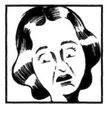
Nicknamed “the Angel of the Battlefield,”
Clara Barton
continued nursing wounded soldiers throughout the war. Then she went on to found the American Red Cross, an organization dedicated to providing aid to victims of wars and natural disasters. And she didn't just sit in her office. When the Spanish-American War broke out in 1898, the seventy-seven-year-old Barton brought medical supplies to American soldiers on the battlefield in Cuba. Two years later, when a hurricane devastated Galveston, Texas, Barton rushed to the scene to distribute food and medicine. She retired in 1904, at the age of eighty-three.
Clara Barton
continued nursing wounded soldiers throughout the war. Then she went on to found the American Red Cross, an organization dedicated to providing aid to victims of wars and natural disasters. And she didn't just sit in her office. When the Spanish-American War broke out in 1898, the seventy-seven-year-old Barton brought medical supplies to American soldiers on the battlefield in Cuba. Two years later, when a hurricane devastated Galveston, Texas, Barton rushed to the scene to distribute food and medicine. She retired in 1904, at the age of eighty-three.
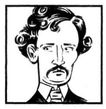
Killing President Lincoln was just part of
John Wilkes Booth
's larger plan to destroy the U.S. government, and, in his twisted mind, avenge his beloved Confederacy. While Booth was shooting Lincoln, Booth's friend Lewis Powell charged into the home of the secretary of state, William Seward, and stabbed him in the face and neck. Seward recovered; Powell was captured and hanged. A third member of Booth's gang was supposed to murder Vice President Andrew Johnson. But he chickened out and got drunk instead. He was hanged too.
John Wilkes Booth
's larger plan to destroy the U.S. government, and, in his twisted mind, avenge his beloved Confederacy. While Booth was shooting Lincoln, Booth's friend Lewis Powell charged into the home of the secretary of state, William Seward, and stabbed him in the face and neck. Seward recovered; Powell was captured and hanged. A third member of Booth's gang was supposed to murder Vice President Andrew Johnson. But he chickened out and got drunk instead. He was hanged too.
Booth, meanwhile, escaped from Ford's Theatre on horseback and raced to the home of his friend Dr. Samuel Mudd, who treated his broken leg. Over the next two weeks, Union soldiers chased Booth through Maryland and into Virginia, where they finally trapped him
in a barn. When Booth refused to come out, soldiers set the barn on fire and shot into the burning building. A bullet sliced open Booth's neck, and he died muttering, “Useless, useless ⦔
in a barn. When Booth refused to come out, soldiers set the barn on fire and shot into the burning building. A bullet sliced open Booth's neck, and he died muttering, “Useless, useless ⦔
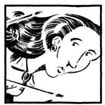
After serving time in a Northern prison for spying,
Belle Boyd
sailed for Britain in 1864. And when her ship was captured by the Union navy, her story took another amazing turnâshe and the Union sailor in charge of guarding her fell in love. Boyd convinced him to run away with her, and their marriage, in London, was headline news across Europe and in America. Boyd began an acting career in Britain, returned to the United States after the war, and continued performing on stage until her death in 1900.
Belle Boyd
sailed for Britain in 1864. And when her ship was captured by the Union navy, her story took another amazing turnâshe and the Union sailor in charge of guarding her fell in love. Boyd convinced him to run away with her, and their marriage, in London, was headline news across Europe and in America. Boyd began an acting career in Britain, returned to the United States after the war, and continued performing on stage until her death in 1900.
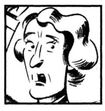
Defending his beating of Senator Charles Sumner,
Preston Brooks
insisted that he had gone easy on Sumner. “If I desired to kill the Senator, why did not I do it?” Brooks asked. “You all admit that I had him in my power.” Facing possible punishment from Congress, Brooks resigned from the Houseâbut was immediately reelected by South Carolina voters. He triumphantly returned to Washington and served until his death in 1857. He was thirty-eight years old.
Preston Brooks
insisted that he had gone easy on Sumner. “If I desired to kill the Senator, why did not I do it?” Brooks asked. “You all admit that I had him in my power.” Facing possible punishment from Congress, Brooks resigned from the Houseâbut was immediately reelected by South Carolina voters. He triumphantly returned to Washington and served until his death in 1857. He was thirty-eight years old.
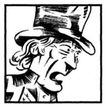
John Burns
recovered from the wounds he got at the battle of Gettysburg. Soon newspaper reporters and photographers started showing up at his house, eager to tell the storv of the seventv-vear-old soldier. When Abraham Lincoln came to town to give the Gettysburg Address, he met the famous Burns, and the two men chatted as they walked down
the street. Burns refused to make a big deal of his role in the battle, though. When asked about it, he simply said, “Oh, I pitched in with them Wisconsin fellers.”
recovered from the wounds he got at the battle of Gettysburg. Soon newspaper reporters and photographers started showing up at his house, eager to tell the storv of the seventv-vear-old soldier. When Abraham Lincoln came to town to give the Gettysburg Address, he met the famous Burns, and the two men chatted as they walked down
the street. Burns refused to make a big deal of his role in the battle, though. When asked about it, he simply said, “Oh, I pitched in with them Wisconsin fellers.”
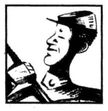
Still recovering from his Fort Wagner battle wounds,
William Carney
moved back to Massachusetts, found work as a mail carrier, and married a woman named Susannah. He was the first African American to be awarded the Congressional Medal of Honor, but it took a whileâhe didn't actually get the award until 1900. When he died eight years later, flags across Massachusetts were lowered to half-mast, the first time this honor had been given to an African American citizen.
William Carney
moved back to Massachusetts, found work as a mail carrier, and married a woman named Susannah. He was the first African American to be awarded the Congressional Medal of Honor, but it took a whileâhe didn't actually get the award until 1900. When he died eight years later, flags across Massachusetts were lowered to half-mast, the first time this honor had been given to an African American citizen.

The young drummer boy
Johnny Clem
served with the Union army through the end of the war. Then Ulysses S. Grant tried to help get Clem into the U.S. Military Academy at West Point, but Clem kept failing the entrance exam. So Clem returned to the army and stayed there his entire career, gradually rising to the rank of general. When he finally decided to retire in 1915, he was the only Civil War veteran still left in the army.
Johnny Clem
served with the Union army through the end of the war. Then Ulysses S. Grant tried to help get Clem into the U.S. Military Academy at West Point, but Clem kept failing the entrance exam. So Clem returned to the army and stayed there his entire career, gradually rising to the rank of general. When he finally decided to retire in 1915, he was the only Civil War veteran still left in the army.

Jefferson Davis
did not agree that the South had lost the Civil War. Determined to carry on the fight for Southern independence, Davis was hoping to slip into the mountains of the South and continue leading the war from there. A month after Lee's surrender, however, Davis was surrounded and grabbed by Union soldiers in Georgia. A rumor soon spread that he had been trying to escape disguised as a woman: “Jeff Davis Captured in Hoop Skirts” announced one Northern newspaper.
But this wasn't quite accurate. What probably happened was that as Union soldiers closed in, Jefferson's wife, Varina, threw her shawl over her husband, hoping to hide his famous head. So he was captured wearing her shawl, not her dress.
did not agree that the South had lost the Civil War. Determined to carry on the fight for Southern independence, Davis was hoping to slip into the mountains of the South and continue leading the war from there. A month after Lee's surrender, however, Davis was surrounded and grabbed by Union soldiers in Georgia. A rumor soon spread that he had been trying to escape disguised as a woman: “Jeff Davis Captured in Hoop Skirts” announced one Northern newspaper.
But this wasn't quite accurate. What probably happened was that as Union soldiers closed in, Jefferson's wife, Varina, threw her shawl over her husband, hoping to hide his famous head. So he was captured wearing her shawl, not her dress.
Davis spent the next two years in prison, charged with treason against the United States. He was never actually put on trial, though, and was released in 1867. Right up until his death in 1889, Davis continued to proudly insist that the South had been justified in seceding from the Union.
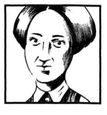
Other books
Twelve Minutes to Midnight by Christopher Edge
The Memory of Trees by F. G. Cottam
The Weavers of Saramyr by Chris Wooding
Driven to the Edge: A Bad Boy Hitman Romance by Morgan Black
Heather and Velvet by Teresa Medeiros
Collected Stories of Carson McCullers by Carson McCullers
THE UNKNOWN SOLDIER by Gerald Seymour
Everywhere That Tommy Goes by Howard K. Pollack
The Wretched of Muirwood by Jeff Wheeler